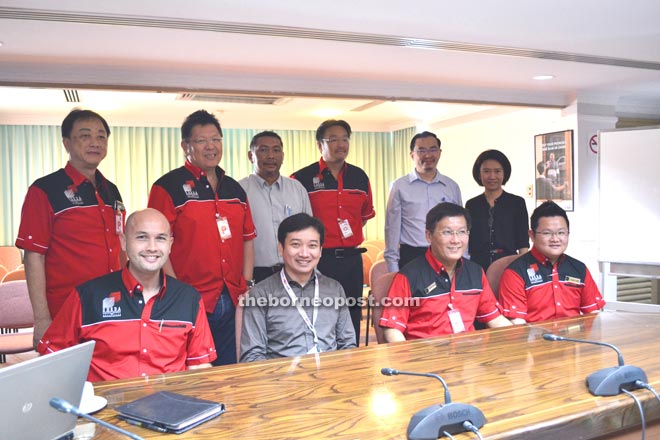
The Sheda State Council delegation, led by their president Wong (seated second right), and Sarbini (seated second left).
KUCHING: The State Council of Sarawak Housing and Real Estate Developers’ Association (Sheda) is urging TM Berhad Sarawak to focus on providing quality services to end users and generate revenue from subscriptions.
It said TM should not focus on profiteering from developers, who are currently being charged capital contribution and connection charges.
This was one of the matters raised by the new Sheda State Council, led by president Joseph Wong Kee Liong, during a courtesy call on TM Berhad Sarawak general manager Sarbini Hamdan at his office at TM100, Kuching.
The visit was to introduce the council members to Sarbini and to raise telecommunication-related issues that are currently affecting the housing and real estate industry.
This included telecommunication infrastructure, capital contribution and connecting charges, coverage for Unifi, and the quality of internet connectivity in the state.
It was raised that TM had been charging unreasonable amounts to developers in the past and Sheda was of the opinion that uniformed rates would create transparency and enable developers to factor them into future costing.
Sheda also urged TM to invest in infrastructure, which can complement commercial developments such as shophouses and shopping malls, in order to increase the overall quality of the project and indirectly boost cluster economies in the vicinity.
Sheda also appreciated that TM was formulating a robust business model on strata titled residential and commercial development around a win-win-win situation for TM, developers and end users.
During its sharing session, TM noted it was aware of the need to remain competitive and attract the public to continue subscribing to TM facilities and services, and welcomed constructive criticisms that may help it increase its quality and reach in the state.
One of the key takeaways of the session was TM’s confirmation that it was not necessary for private developers to engage licensed or nominated contractors by TM for the purpose of constructing infrastructure and facilities such as manholes, ducting, internal and external wiring, provided the developers obtained approval of the related design plans and specification from TM through their consultants.
TM also agreed that feedback and/or approval of design plans and connection charges (where applicable) should be provided to the developers or their consultants within 60 days from the date of submission.
